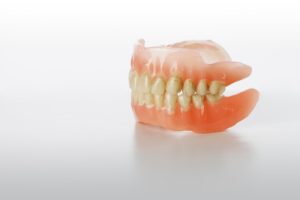 Unfortunately, nearly 54,000 Americans will be diagnosed with oral cancer this year and almost 10,000 will die because of it. Despite medical advances, these numbers have not significantly improved in decades. One of the biggest risk factors is actually slipping dentures! Although your dentures in Larchmont Village will not cause oral cancer, loose restorations combined with poor oral care can lead to damage that causes the cells in your mouth to become cancerous. Fortunately, many signs let you know it is time to act, as your dentist explains.
Unfortunately, nearly 54,000 Americans will be diagnosed with oral cancer this year and almost 10,000 will die because of it. Despite medical advances, these numbers have not significantly improved in decades. One of the biggest risk factors is actually slipping dentures! Although your dentures in Larchmont Village will not cause oral cancer, loose restorations combined with poor oral care can lead to damage that causes the cells in your mouth to become cancerous. Fortunately, many signs let you know it is time to act, as your dentist explains.
What Are the Visible Signs Your Dentures Need Adjustment or Repair?
You will be able to see evidence of each of the following reasons to ditch your current dentures:
- Broken teeth – If you break a tooth, do not attempt to reattach it yourself which can result in an irregular fit and future problems.
- Chips or cracks – You don’t have to lose an entire tooth to compromise the function of your dentures – chips and cracks need to be addressed, as well. They create surfaces that can irritate or cut oral tissues.
- Facial shape changes – Like natural teeth, your dentures play a role in keeping your cheeks looking full and even. If you notice changes to your cheeks or jawline, your dentures likely need an adjustment.
- Pressure sores – Resulting from slipping dentures, pressure sores developing is evidence your dentures need to be adjusted.
- Gum irritation – This should not happen once you acclimate to your dentures. So, it may indicate a defect in the denture’s surface.
- Oral sores – Canker sores and raw patches of tissue may stem from fissures in your denture’s surface, which is a call to action.
- Stains – Look for stains when you clean your dentures. Your dentist can counteract most types of discoloration and while they are at it see if you need a replacement.
What Nonvisual Signs Could Indicate the Need for Denture Adjustment?
You might not be able to see these warning signs, but they indicate your dentures need adjustment or replacement:
- Difficulty chewing – If you have had your dentures for a while and notice difficulty chewing later, it may indicate the need for refitting.
- Discomfort – If you notice jaw soreness, uneven pressure, or especially sharp pain when biting down, address this with your dentist as soon as possible.
- Fit changes – Your top dentures should suction smoothly to your gums. Your bottom dentures should float above your gums but stay in your mouth easily. Partial dentures should stay in line with your teeth without significant movement.
- Speech pattern changes – If you experience slurred speech, lisping, or excessive salivation long after you first got your dentures, you may need an adjustment.
- Persistent odors – If you detect that odor lingers even after thoroughly cleaning your dentures, this may indicate a defect in the material.
To limit your risk of oral cancer, refrain from heavy alcohol use, don’t use tobacco at all, and have your dentures in Larchmont Village checked by your dentist regularly. If you face any of the issues discussed above, don’t hesitate to act.
About the Author
Dr. Benjamin Geller earned his dental doctorate from the University of California at San Francisco and went on to specialize as a prosthodontist which means he is highly trained in dental implants, crowns, bridges, dentures, jaw disorders, and more. Both he and Dr. Gloria Garcia-Geller are members of the American Dental Association. If you are interested in dentures, they offer full dentures, partials, or implant-supported dentures. Schedule a consultation on their website or call (323) 467-1472.
